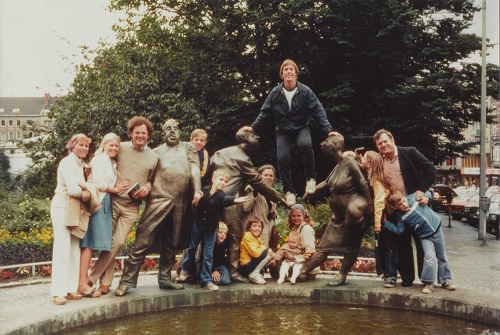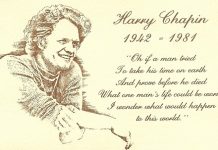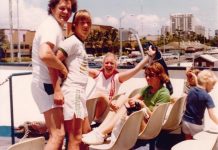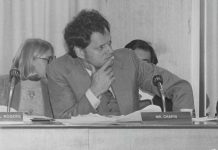By Ira Kantor
Photos Courtesy Chapin Productions LLC
The life of Harry Chapin, charismatic musician and iconic humanitarian, was unexpectedly and tragically taken on July 16, 1981. He was 38 years old.
A human dynamo whose sheer tenacity landed him on the Billboard charts, on Broadway, in the White House, and at the forefront of the world hunger movement, Chapin lived by the mantra of “When in doubt, do something.” In following this mentality, Chapin’s 10-year solo career encompassed more than 2,000 concerts, nine studio albums, the creation of global nonprofit World Hunger Year (now WhyHunger) and the love and respect of fans, fellow musicians and key political influencers alike.
Hailed as a consummate musical storyteller, Chapin is best known for his character-driven tunes —“Taxi,” “Sniper,” “W-O-L-D,” “A Better Place to Be,” “30,000 Pounds of Bananas” and “Cat’s in the Cradle” included. Yet despite having only four Top 40 hits to his name, Chapin’s songs remain one of a kind — elevating him to the same artistic status as classic singer-songwriters of the era like James Taylor, Jim Croce, Gordon Lightfoot and John Denver.
Nearly 40 years after his death, the following 10-part oral history seeks to tell Harry Chapin’s story through the firsthand, on-the-record testimonies of the “characters” who knew him best – more than 50 family members, friends, business and political associates and musical contemporaries. For added context, Harry’s own voice, along with other relevant news articles and reviews during his lifetime, are included in italics.
While there are other individuals and events crucial to Harry’s tale who were unable to be interviewed or showcased for this series, this still seeks to provide a well-rounded retrospective of a man whose life, being, sense of accomplishment and legacy remain unsurpassed to this day.
***
Chapter IX
EMPTY
Tom Chapin (Brother): The biggest thing for me was when Harry died, the universe cracked a little bit for us.
I was the one that got the phone call. I was not surprised but I was shocked.
Rex Fowler (Musician, Aztec Two-Step): I don’t remember exactly when we rode in the car with him but again no one who knew Harry personally who had ever driven with Harry was shocked or surprised that he got into this terrible car accident. He might have been the world’s worst driver because he was the original multi-tasker. He literally would sit there and type on his typewriter and drive the car and carry on conversations, weaving in and out of traffic, scaring the living bejesus out of everyone in the car.
Sandy Chapin (Wife): What I do remember is that Jason had a job with a lumber company in town. He came in to our bedroom and he said, ‘Which car do you want me to take?’ I said right away the van, because Harry didn’t have a reputation for being the best kind of driver. The other car was my daughter Jaime’s VW Rabbit, I guess it was. He said, ‘No, no, no I want to take the Rabbit because I want to listen to music,’ because I guess she had a pretty good tape system. So he lost and Jason went to work in the van and Harry took off in the Rabbit, which to the best of our knowledge broke down even though it had just come out of the shop.
I had used the car to go to a Long Island Cares meeting before we went to Hawaii and I had noticed that it decelerated while I was driving. So I made a point of staying way over in the right-hand lane. I did get to my meeting. I did get home and then it hadn’t happened again. I remember that I had mentioned that when the car went in.
Jason Chapin (Son): I did have a feeling that something strange was going on because it was just very quiet. I don’t know who was home at the time but I remember…there was a phone call, and then there were a couple of other phone calls, and then my father’s assistant, Don Ruthig, came over some time around lunch time and sat down in the upstairs TV room with I think it was just my brother Jono and myself, and said that he had to tell us some news.
He told us that my father was in the accident and they took him to the hospital. I think Don told us that they tried to save him but that he had died. From that point on it seemed like it was very crazy because there were lots of phone calls and lots of people coming by and there was, you know, stuff on TV and radio and friends coming over. There was very little time to really absorb that he had died. I remember I went for a walk down to the beach and I was just by myself for about three hours trying to figure out how this was all going to change our lives with him gone, and the whole shock of it all.
I think just like any other family that deals with a sudden death there was shock. We were all trying to understand that this was really happening, and then at the same time what made it a little different for us was that because he was famous a lot of other people found out as soon as we did and so there were people coming by and trying to offer their support. So we weren’t really together as a family and alone; we were together as a family with a lot of other people. We were kind of all aware that we were together but not really able to talk to each other and to see how we were doing. It was really, I think, a few days until we were really able to see how we were all doing.
Don Ruthig (Personal Assistant): He died on my birthday. He was supposed to be at my house for a birthday party for a big barbecue. Sandy was over there with the kids. We were all setting up for the barbecue and Harry was missing. Sandy went home for some reason to pick up something and then I got the news that Harry had been killed. I had to go over and tell Sandy and all that. That was kind of a horrendous day.
I think our booking agent at that point was ICM, or something like that. (Harry) was on his way into the city to have a meeting with his booking agent and he didn’t show up.
Shelly Schultz (Booking Agent): He was coming to have lunch and I called [Harry’s brother] Jeb [Hart]. I said, ‘Jeb, where is he?’ He was like an hour late. He said, ‘I thought you heard,’ or something. Anyhow that’s how we found out. That was terrible.
Josh Chapin (Son): It was Don Ruthig’s birthday. Harry had a few morning meetings and he had a concert that night but then he was supposed to show up at this place in the next town over. He never showed up and people were getting more and more nervous. Then we went back to my house and I think a few people started to find out. I think after they found out, somebody was trying to get me out of the house — I guess they wanted to get a game plan or something for the kids, I’m not quite sure — but someone tried to get me out of the house.
We were going to do a Burger King run so we went to Burger King and then…we stopped at 7-11 and they played “Cats in the Cradle” and just [from] the whole aura about the whole day, I knew that he was dead. I actually knew.
I prepared myself somehow at that moment — just the whole combination of events of the day because he was supposed to show up some time around noon and it was like 4 p.m.
Don Ruthig: Jeb and his partner Bob Hinkle finally found out what happened. I think they finally got in touch with the police and found out that he had been in the accident on the [Long Island] Expressway. So Jebbie called me and confirmed what we kind of already kind of were fearing, that something serious had happened.
I grabbed Josh, who was swimming in the pool at my house, and I took him home. He went upstairs and then I told Sandy what was going on. Sandy just kind of shut down initially. I think she was so shocked. I don’t think she sat down with Josh and Jenny and told them until probably several hours later. His daughter Jaime was still in Hawaii and they got in touch with Jaime and she got on a flight back from Hawaii. I don’t think I went home. I got to their house and after I told Sandy I didn’t go home for several days because the whole process had started of people coming to the house.
I don’t know whether the band was there yet or not, but yeah, they were all coming to my place.
We were going to have a barbecue and then we were going to Eisenhower Pavilion at Salisbury Park. It was a group show, so it wasn’t a benefit, I don’t think, that night. I think it was a paid gig. A real concert.
Howard Fields (Drummer): That show was set up for Eisenhower Park — free concert — out in Long Island. So we set up early. Harry’s right-hand man was a fella named Don Ruthig, who had been working for him for a few years, and set up his daily schedule. So I was at his house…and all I can tell you is my experience was that I was hanging out and walking into the house and Don was sitting there in his living room looking a little odd. I didn’t think much of it…But the phone rang and he lunged for it and I don’t remember the words he was saying but he hung up the phone and he broke down in tears and says, ‘It was him, he’s dead.’ He had evidently gotten a phone call some time earlier, which put him in that odd mood. He was told that there was an accident and it was believed that Harry Chapin was involved in it. It was very serious. So they called Don and he was just waiting for confirmation. That was the phone call he got while I was in the room which caused him to fall to tears.
I know [guitarist] Doug Walker was there and John Wallace arrived a little bit later and found out about it. Then I guess from there we went back to the venue where the crowd had already started gathering for the concert. I remember there was a New York promoter named Howard Stein – he was involved in putting this pre-show together and he made the announcement to the crowd that Harry Chapin was involved in a fatal car accident. It was a very odd thing. I mean our sound company was there and I said to myself, ‘Geez, I guess I’d better take my drums home with me.’ It was a very odd little moment because otherwise all our equipment would go with them and for the whole summer we’d be doing shows with them hauling our equipment around. I just remember that.
From there I remember my mom and dad were at that show and we were heading to Harry’s house and I was in my car and I saw them. They were right on the road that I was driving on and they said, ‘What’s going on, where are you going?’ I said, ‘I got to go to Harry’s. I’m going to Harry’s house.’ I said, ‘I have to follow these cars or otherwise I don’t know where I’m going.’ I had to like really kind of drive away from there.
We went to his house and stayed there and the house really started filling up with people. I remember Harry, Tom, and Steve’s dad Jim was there, Jim Chapin, and I remember him breaking down at one point in the evening. I remember Garry Trudeau was there, the Doonesbury guy. He was there. They were friends. It was quite a full house.
From Newsday, July 17, 1981: Harry Chapin, singer-songwriter and a keystone in the Long Island cultural arts scene, died yesterday, the victim of a fiery crash of his car and a tractor-trailer on the Long Island Expressway.
The 38-year-old Chapin of Huntington Bay, who suffered a massive internal hemorrhage from a lacerated aorta, was pronounced dead at Nassau County Medical Center at 1:07 p.m.
Death came in a swerve, a crash, an explosion and a burst of flames that turned a pleasant summer’s day into a chaotic horror. Chapin was killed at 12:29 p.m. while driving westbound on the Long Island Expressway near Exit 40 in Jericho. Swerving from the left lane to the center lane, Chapin was struck from the rear by a truck unable to brake in time. The car burst into flames and was pushed 300 feet to the right side of the expressway. Several rescuers dragged Chapin from the burning wreckage after the driver whose truck collided with Chapin’s Volkswagen used a pocket knife to cut away the seat belt that held Chapin in his seat…
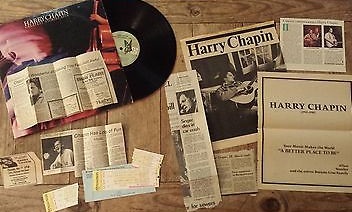
Sandy Chapin: I had a premonition there was something somebody was not telling me and there was something wrong. I mean if I look back, it’s very odd that I was in this cocoon. I was definitely definitively in a cocoon. I didn’t turn on the radio or anything like that…I think at a certain point there probably was something on the news but I wasn’t turning into anything. So that’s as much as I remember about it. His fans came out because they were waiting at Eisenhower Park. It was all pretty crazy for a few days.
Josh Chapin: I mean it’s crazy when somebody dies when you’re 8. It’s like he’s the same size as me almost exactly. When you’re locked in as an 8-year-old, I just think of him as this giant, you know. When that happened, yeah I just cried. It was a big moment for me because I cried my eyes out for probably less than five minutes. That was the grieving I did. After that I remember spending a lot of time trying to make people like laugh or feel good. So it was a little weird.
I felt a lot of guilt afterwards because I mean I’d go to school and my friends would be like, ‘I cried for three days after your dad died,’ and I’m like, ‘Shit, I only cried for five minutes.’ Everybody grieves differently obviously.
I also realized how I felt about religion and God and having the dual message of the whole thing — ‘Your dad is the most amazing man that ever was,’ and then you had religious people coming up to you saying ‘Everything happens for a reason.’ I remember as an 8-year-old, trying to reconcile those two points and be like, ‘Well, what was the reason then?’ So I definitely had thought that all day and I just didn’t want to have anybody or I didn’t want anybody else talking about God. I was definitely off of God for at least that day and the immediate future. Yeah, didn’t see the God angle on that one.
I think there were questions I would have asked of him or the way I grew up. For whatever reason I think I needed something that I didn’t get because he was on the road or my mom was – I don’t know, there was something about my childhood that just doesn’t jibe but I had no idea what it was. I have no idea. You know, obviously there is the very daunting thought process of, this is a man who more than anybody I’ve ever known did more in a 10-year period in terms of being effective or being productive or trying, you know, a just nonstop whirlwind of effort than anybody out there, so how do I admire that. I think about it as a brilliant way to live but also not making myself crazy trying to carve out my own existence.
Bill Ayres (Friend, WhyHunger Co-Founder): I was in Massachusetts, up around Fall River. It was the summertime in July and my wife asked me to go up with our little baby to visit her family. They hadn’t seen the baby. We drove up there and we were staying at one of her cousins’ house. We had gone to the beach that day and for some reason I just had this very kind of down feeling, and I’m not that kind of person. My wife said, ‘What’s the matter with you?’ I said, ‘I don’t know, just, I don’t know.’ We’re getting ready for dinner and her cousin’s husband came up and said, ‘I don’t know how to tell you this,’ he said, ‘but I just was looking on the television and your friend Harry Chapin died in an automobile accident.’ I went down and sure enough it was true. I said to my wife, ‘We have to go.’ We put the baby in the car and I called Sandy and said, ‘I’ll be over.’ I drove home. I don’t know how I did it with the tears and everything but I did and went over to visit the family. It was a very traumatic time but people came through and helped us out.
Dave Marsh (Friend, Critic): One day I walked into Crazy Eddie’s down the street from my apartment and somebody made a very bad joke about Harry dying in a car crash. I said, ‘That’s not funny.’ He said he wasn’t joking about that part. I burst into tears and ran home. Literally ran home. That’s the frame of the story. It was just a horrible thing to happen. This was not a person I wanted to depart this Earth early.
Thomas Downey (Friend, Former Politician): I remember thinking that God must be angry with us for some reason to take away Harry Chapin.
Tom Chapin: I was the one who got the news. I lived in 8 Folk Street, right by the Brooklyn Bridge in an apartment right underneath where [Jeb] Hart and [Bob] Hinkle, who were managing Harry — they were in the top floor, fifth floor. I was on the fourth floor and Hart and Hinkle were waiting for Harry to have a meeting with his booking agent in Manhattan. I was down there alone and there was a brand new secretary who was there alone. I get a knock of the door and she said, ‘Tom, would you come up here please because it’s about Harry.’ So I went upstairs, got on the phone, I said, ‘Hello?’ And this cop says, ‘Who’s this?’ I said, ‘Tom Chapin, who are you?’ I said, ‘What’s the matter?’ We talked a minute and they were trying to identify the body. I’ll tell you what identified it. It was a watch that Michael Moore gave Harry for doing a benefit to start his Flint, Michigan newspaper. Harry did a bunch of benefits for him and he gave him a watch. He didn’t have his wallet on him.
The car was Jaime’s car. It was a VW Rabbit. But there was a watch from the Flint Voice, and I said it was Harry, and the guy said, ‘Well you need to come out and identify the body.’ I said, ‘OK.’
So then I got off the phone and I called Jeb. The secretary said, ‘Jebbie’s been calling trying to have me track Harry down.’ So I called Jeb – they were at this booking agent’s office in Manhattan — and Jeb goes, ‘That’s not his car!’ I said, ‘No it’s Jaime’s car.’ So we started calling around and just telling people stuff. I was very centered; as I say I was shocked but not surprised. So I called my wife and she was out with the two little girls. Lily was two weeks old, my youngest daughter, and she was out visiting a friend with Abigail who was 2 at that point.
Then there’s various phone calls back and forth. Then Jeb and Steve call. Then I call out to Jersey because it’s July, you know, and my brother James is there. So I call and talk to Michael and tell him the story and nobody’s answering on the other phone up at the house. Then finally James calls back and I talk to him about it and I tell France and France goes, ‘Your mother…’
My mother was working still out at Garland Publishing and it’s now about 4:00 so she’s getting home really quickly. I talked to Steve and Jeb and they said, ‘We’ll go identify the body; you go tell Mom.’ I said, ‘The guy wants you to go right away.’ Steve says, ‘There’s no hurry. Harry’s going nowhere. We’ll go out there when we get there.’ Steve and Jeb went out there to identify the body. So I tell this woman, you know, the secretary. I go down the house, put a coat on and grab some stuff and I run up to my mother’s apartment and I go inside. I get there just as she’s arriving — ‘Oh, isn’t this nice to see you.’ I said, ‘Ma, I got some bad news,’ and she goes, ‘The baby.’ ‘Nope, she’s fine, it’s Harry,’ and then she goes ‘Ugh’ and sits.
So we started talking about stuff and decided we’re all going to end up in New Jersey because that’s where everybody is in the summertime. James’s wife comes over and I drive out to Jersey with Diana and my mother and myself and asked Bonnie to meet us out there. We’re driving out and there’s this incredible sunset; just these gigantic pink clouds. It was unbelievable. We’re driving into the sunset, driving in the west and we get there. I come up to the house and I’ve been really sober the whole way through. Get to the house, walk up into the house and the whole family is there and I said, ‘Wow I thought James was here alone.’ I lost it.
There’s lots of people who need to be taken care of, you know, so I was just totally just taking care of all the stuff until it finally got to that.
From Newsday, July 17, 1981: Six hours later, thousands of fans pouring into Eisenhower Park’s Lakeside Theater expecting to hear Chapin in concert wept upon hearing the announcement: “The concert has been canceled because of the tragic death of Harry Chapin.”
Nancy Heller (Friend): There was a song I had written that we worked on together that weekend that he wanted to give to Pete Seeger. The tape of the song was in my bag to give to him the day he died.
Big John Wallace (Bassist): We wound up going back to Eisenhower Park. I think we just kind of wandered up on stage and then somebody made the announcement, or maybe they had known already, I’m not sure. The people were just standing there milling around too. I don’t think we played or unpacked or anything but the people kind of joined hands in this big circle and walked around this big circle. That’s all that I remember of that day.
From Newsday, July 17, 1981: At 8:25 p.m., after the stage crew had gone home, several thousand of the 25,000 fans who had been expected to attend the concert huddled quietly in small groups. A crowd gathered in a circle around Nancy Heller, 17, of East Northport, as she played one of Chapin’s songs, “All My Life’s a Circle,” on her guitar. They sang enthusiastically and passed a lighted candle around the circle.
“He inspired me to write my first song,” Ms. Heller said. “I came up to him at a concert and said, ‘Will you be my friend?’ He said. ‘Forever friends.’ My God, how he touched me.”
Nancy Heller: I went down to the backstage area to see who was there, to see if anybody I knew was there. The family was not there. The band members, the manager was there and then I came back out and the people next to me, among the things they had in their cooler was some beer and I asked them for a beer and drank a couple of them. With a little liquid courage there was another guy on the other side who had an Ovation guitar and he was playing, “Bye, bye Miss American Pie.” I walked up to him emboldened by the beer, grabbed the guitar out of his hands, said ‘You’re playing the wrong songs,’ and started playing Harry music. The next thing I know people are in a circle around me singing. It was a pretty surreal experience, you know. We kind of had our own little memorial. A few hundred people there singing, “All My Life’s a circle,” and “Cats in the Cradle” and other things and just trying to cope with a very, very sad situation.
I had just turned 17.
Marie “Peachie” Marsden (Friend): I remember Steve hugging us and saying, ‘You have to help us do this. We don’t know how to do this.’ We’re Irish Catholics and what we do is we mourn privately but usually we have a party to celebrate a person’s life. So that’s what we would do about Harry. We would celebrate his life because his life was beautiful. I remember Steve putting his arms around both of us and saying, ‘You got to help us do this. We don’t do this well. We don’t know how to do this.’
***
Don Ruthig: There are some personal kind of things. The funeral director was a friend. He had kids Josh and Jenny’s age and they were friends. Chris [Jacobsen] was great in helping us get things together. I said something to Sandy about, ‘What’s he going to be dressed in? Do you have a suit?’ And she said, ‘Oh no, we’re not putting him in a suit. He never wore a suit in his life, he’s not going to wear one for his funeral,’ so he was dressed in just a blue Oxford shirt open at the neck. Loafers. I don’t think they were jeans, I think they were some like khakis. I just remember the blue Oxford shirt.
Chris Jacobsen (Funeral Director): Harry was a great guy, a great father, a real person. Nice to be around. No airs. A genuine all-around nice guy. If you didn’t know who he was, he wouldn’t be anything at all. He was just a down to earth real-life guy who loved his family and his kids and was there for games and everything. It’s not like what you’re seeing in the papers with stars having problems…If you could have known him and met him you would have liked him. The whole thing was a major tragedy for the whole community.
Shelly Schultz: I remember tons of people and everybody was in shock because here was a guy who gave so much, who left too early. The thing that occurred to me was that I don’t think his family got the best of him. Not because he didn’t want to; he had priorities. I never spoke to Sandy about that ever, ever because that’s very personal. But my hunch is his family never got the best of him.
Tom Chapin: (Sandy) had the body lay out in state and, of course, it wasn’t him except his hair. But it took away the shock of the accident, you know what I mean? You see something there that’s in front of you so it’s not him in terrible agony. I walked up, and I just looked at him, and I touched his hair, and I said, ‘What was it, Harry? What was the fucking hurry?’
Jason Chapin: My mother — she’s unbelievable, an incredible mother. She’s very motherly, very protective of her children and always trying to figure out how they’re doing. I think that she was conscious of what we were going through but at the same time I think she was trying to take care of us. At the same time, everyone was trying to see how she was doing and to see what she needed. I don’t think she really was able to spend a lot of time trying to think about what she felt. I think that must have been an extremely difficult time for her trying to deal with all of the things that she didn’t expect she’d have to deal with.
Soon after she had to deal with the funeral and the service and the viewing. When I think someone’s in that situation, I think they are just trying to get through. I don’t think they are really able to step back and say, ‘What’s going on?’ I think they are just going through one thing to another, and then they hope that after the funeral and after the service that they can then try and deal with everything they have to be able to deal with.
Josh Chapin: I mean they do amazing work, those people. He wasn’t Sonny Corleone. I just remember his face anyway. That face meant vitality to me. I kissed him and seeing the cold, waxy lips…it was really fucked up.
Jason Chapin: We had a private viewing so I was very grateful that I was able to say goodbye to him. The casket was open.
***
Tom Chapin: A week later we did the big memorial event at Grace Church and some amazing people came and talked about Harry’s legacy, what he meant to them, from Ralph Nader to Patrick Leahy, just down the line — Pete Seeger, you know, all these people. But the thing that really clarified everything for me was when my brother James — who is now gone as well — got up and said, ‘We can’t fill Harry’s shoes. We can’t be Harry and even if we could we wouldn’t want to be. We can’t fill his shoes but what we can do is fill our own shoes a little fuller,’ and that…was really clarifying for me.
Josh Chapin: I was always kind of a ham. I remembered it being the first real memory of me being nervous and not wanting to get up and sing “Circle.” He always could never stop me. I always was like, ‘Oh yeah, definitely, I’ll get up on stage,’ and I didn’t want to. My uncle Tom kind of gave me the option, I think, to do it or not but I saw him start to cry. I got up from my seat and went to sing with him. That was the only personal memory, I remember. I remember being conscious of being nervous and wanting to get up.
Big John Wallace: I remember a little bit about the memorial in Grace Church but it was kind of a blur. It was one of those things that it took a long time. I mean the shock came in and it set there but it even took a long time for the shock to completely set in and for everybody to deal with it. So I don’t have a lot of other memories at the time right after except coming home and seeing a higher counting on the old-fashioned message machine than I’d ever seen before. I remember that — ‘Wow.’ That was kind of nice thinking about all those people that heard what happened and tried to reach out.
Sandy Chapin: I guess it was kind of a blur. I think it was certainly wonderful, but if I have any recollection, I think I just kept looking at my children’s faces to see how they were doing. I remember certain things, but I was just very conscious of the children and how they were doing.
Marie “Peachie” Marsden: Steve’s coming back from Long Island at Sandy’s house. We’re heading to his house and what happened was he stopped. We’re in the car behind him and we’re saying, ‘Oh what’s he stopping for,’ and it was the crash site. He just had to have a moment there. He pulled over — that’s where the crash site was – and you could see where they had tried to work on Harry and like different things thrown on the ground and stuff. The car was gone, but the wreck was still there and Steve picked up what was the antenna and for some reason he thought it important because Harry was all about music and this is what we had left of him – just an antenna. So my sister Mary is the one that took it. She said, ‘What are you going to do with that?’ He said, ‘I have no idea; I just picked it up.’ She brought it to a friend of hers and this is what he did. He made a musical note out of it and we put a picture of Harry and [my husband] Zeke in it.
Elspeth Hart (Mother): I always wondered where he’d be if he hadn’t died because I felt he was still at a crossroads with time.
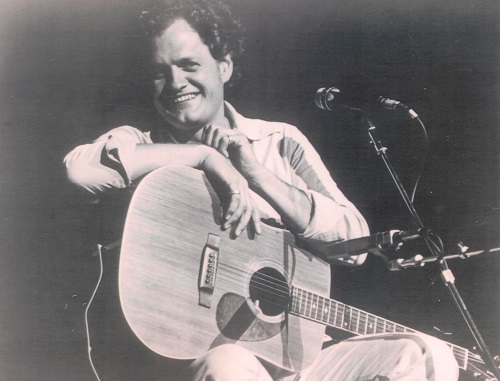
###
###
Share your feedback with Ira at vinylconfessions84@gmail.com.


